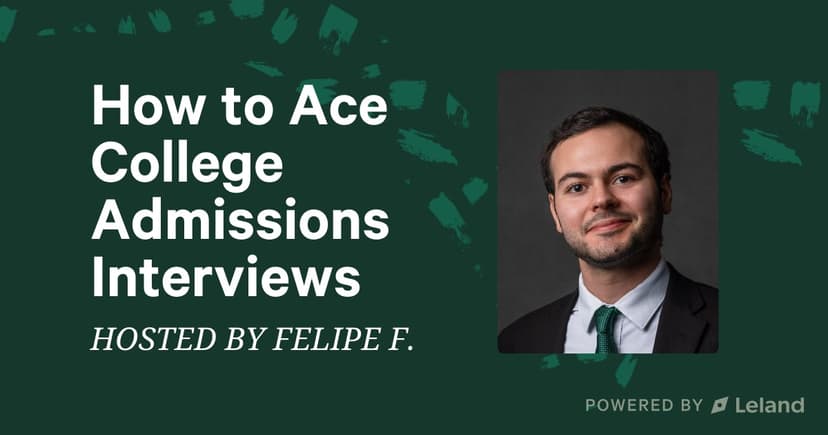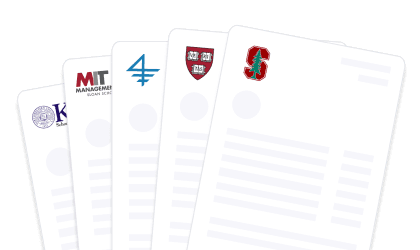
Join a free event
Learn from top coaches and industry experts in live, interactive sessions you can join for free.
Table of Contents
The Power of a College Interview
College interviews offer more than just a chance to discuss your application. They are a unique opportunity to show admissions officers who you are beyond your grades and test scores and to explain why you’re genuinely interested in their school. A well-prepared interview can highlight your academic ambitions, your extracurricular commitments, and the depth of your character—factors that can set you apart from other applicants. Effective interview prep can help you present yourself confidently and make a lasting impression on the admissions office.
In this guide, we’ll walk you through the 10 most common college interview questions you’re likely to encounter, along with detailed strategies on how to answer them confidently and effectively. By the end, you’ll be equipped with the tools to ace your college interview and make a lasting impression on the admissions office.
The College Interview Process
Before we dive into the specifics of each question, it’s important to understand the role of a college interview in the overall admissions process. Not every school offers interviews, but for those who do, they can be a pivotal part of your application. Here’s what you can expect and why it matters:
- Purpose of the interview – The college interview serves as an opportunity for you to present yourself in a personal, direct conversation. This isn’t just about answering questions—it’s about giving the admissions office a deeper sense of who you are as a student, community member, and potential future graduate.
- What to expect – College interviews vary by institution. Some are informational (where you learn about the school), while others are evaluative (where the school assesses your fit for their community). You’ll likely meet with an admissions officer, alumni, or sometimes even a current student. The goal is to assess your fit for the school’s academic programs, campus culture, and values.
- Why interviews matter – Interviews allow the admissions office to see a fuller picture of who you are. You’ll have a chance to explain why you’re a good fit for the school and how you could contribute to their campus community. For high school students, preparing for college interviews can be a daunting task, but it is crucial for showcasing their genuine interest and fit for the school's community. A good interview can sometimes tip the scale in your favor when admissions decisions are made, particularly if you’re one of many strong candidates.
The 10 Most Common College Interview Questions and How to Answer Them
1. "Tell me about yourself."
Why It’s Asked: This is usually the first question in a college interview and helps set the tone for the rest of the conversation. The interviewer wants to get a sense of who you are, what motivates you, and how you express yourself.
How to Answer:
- Begin with your background – Share where you’re from and any experiences or values that have influenced your journey. Example: “I grew up in [hometown], where I developed an interest in [specific area or value].”
- Focus on your interests and activities – Highlight your academic passions and extracurricular activities, especially those that show leadership, curiosity, or personal growth. Example: “My interest in [subject] grew when I took [class or experience] and worked on [project or activity].”
- Explain your goals – Discuss what drives your interest in the program and how your experiences have prepared you for it. Example: “After participating in [activity], I realized I wanted to explore [area of study] and pursue [goal].”
- Connect to the college – Share why this specific school aligns with your plans. Mention programs, clubs, or values that connect with your goals. Example: “I’m excited about [specific program or opportunity] because it matches my interests in [specific goal].”
- Reflect on how friends describe you – Consider how your friends describe you to highlight your strengths and personal qualities. For instance, "My friends often describe me as a dedicated and empathetic person, which is evident in my volunteer work at the local shelter."
Expert Tips:
Organize your answer with a clear beginning, middle, and end. Keep it focused on key points and avoid unnecessary details. Practice speaking naturally to sound confident but not rehearsed. Be yourself, and let your interest in the school and the program come through. Keep your tone positive and highlight the parts of your story that show your strengths.
2. "Why do you want to attend this college?"
Why It’s Asked: This question helps the interviewer understand if you’ve researched the school thoroughly and how well your goals align with what it offers. It also gives you a chance to show how genuinely interested you are in joining their community. Admissions offices use this as a way to identify candidates who are likely to thrive in their unique environment.
How to Answer:
- Be specific and thoughtful – Highlight specific academic programs, faculty members, research opportunities, or extracurricular activities that excite you. For example, mention a course you’re eager to take, a club you’d like to join, or a professor whose work you admire.
- Show alignment with your goals – Explain how the school’s offerings fit with your academic, career, and personal goals. For instance, if you’re passionate about environmental science, point to the school’s strong program or fieldwork opportunities in this area.
- Discuss long-term fit – Describe how the school’s community and resources will help you grow as a student and as a person over the next four years and beyond. Connect this to your ambitions after graduation.
- Reflect on your self-awareness – Mention how the school aligns with your overall personality and interests. For instance, if you value collaboration, talk about how the school’s community supports teamwork.
- Contribute to the school's community – Discuss how you see yourself contributing to the school's community, whether through specific clubs, activities, or personal qualities that align with the college's values.
Expert Tips:
To prepare a strong response, thoroughly research the school’s academic programs, campus life, and faculty to demonstrate genuine interest. Mention specific aspects of the school, such as programs, faculty, or cultural elements, that resonate with your academic goals and personal values. Avoid generic answers like “I want to attend because it’s a great school,” as these don’t distinguish you from other applicants. Use personal examples to connect your experiences and aspirations to what the college offers, such as how a particular program aligns with your high school interests or career ambitions. Finally, let your enthusiasm for the school come through naturally, showing the interviewer that you’re genuinely interested in joining their community.
3. "What is your favorite subject, and why?"
Why It’s Asked: This question gives the interviewer insight into your academic passions and intellectual curiosity. Colleges are looking for students who are genuinely excited about learning and who engage deeply with their interests.
How to Answer:
- Be specific – Choose a subject that you truly enjoy and explain what makes it exciting for you. For example, if your favorite subject is biology, discuss a particular topic or concept within biology that fascinates you, such as genetics or ecosystems.
- Show depth – Talk about how this subject has influenced you. For instance, explain how it has shaped your thinking, sparked career aspirations, or influenced your approach to challenges.
- Connect it to your goals – If applicable, link your passion for the subject to your plans for college and beyond. For example, you could mention how a program or research opportunity at the college will allow you to explore this subject further.
- Discuss a particular character – If your favorite subject involves literature, discuss a particular character that has influenced your thinking or inspired you. For instance, 'A particular character that stands out to me is Atticus Finch from 'To Kill a Mockingbird,' whose integrity and sense of justice have deeply influenced my own values.'
Expert Tips:
When answering, use examples from your high school experience that demonstrate your enthusiasm for the subject, such as a project you worked on, a paper you wrote, or an extracurricular activity. Avoid general statements like “I like math because I’m good at it,” and instead focus on the deeper reasons why the subject resonates with you. For example, explain how solving mathematical problems has taught you to think critically and find creative solutions. Be authentic and convey your passion naturally to make your response both personal and compelling.
4. "What extracurricular activities are you involved in?"
Why It's Asked: This question helps the interviewer understand how you manage your time outside of academics and what qualities, skills, and interests you would bring to the college community.
How to Answer:
- Focus on impact – Highlight a few activities where you’ve made meaningful contributions or shown leadership, initiative, or consistent dedication. For example, discuss a club you helped grow, a role you held in student government, or a volunteer project you initiated.
- Connect to your goals – Explain how these activities have influenced your academic and career interests or helped you develop important skills. For instance, if you’re passionate about writing, you might mention your involvement in the school newspaper and how it strengthened your communication skills and confirmed your interest in journalism.
- Link to the college community – Share how you plan to continue or expand these activities at the college, connecting your interests to the opportunities or organizations the school offers. For example, if you were part of a debate team, you could mention how you’re excited to join or contribute to the college’s debate society.
Expert Tips:
Be selective and focus on a few key activities that best represent your strengths and interests rather than listing everything you’ve participated in. Share specific accomplishments, leadership roles, or memorable experiences that make your involvement stand out. Let your enthusiasm for these activities come through while showing how they’ve prepared you to contribute meaningfully to the college’s community.
5. "Tell me about a challenge you’ve overcome."
Why It’s Asked: This question allows the interviewer to understand how you handle difficult situations and demonstrates your resilience, problem-solving skills, and ability to learn from challenges.
How to Answer:
- Choose a meaningful challenge – Select a challenge that had a significant impact on you, whether it was personal, academic, or extracurricular. For instance, it could be a struggle with a tough subject, adapting to a new environment, or overcoming self-doubt in a leadership role.
- Highlight your actions – Clearly explain the steps you took to face the obstacle. For example, describe how you sought help from a teacher, collaborated with others, or adapted your approach to solve the problem.
- Reflect on the outcome – Share what you learned from the experience and how it shaped your perspective or approach to similar situations. Emphasize growth, whether it’s in your skills, mindset, or relationships.
- Provide a thoughtful response – Describe the challenge and reflect on the lessons learned. Explain how it has shaped your approach to future obstacles, demonstrating your ability to identify problems and articulate specific, respectful suggestions for improvement.
Expert Tips:
Be honest about the challenge, but avoid over-explaining or making excuses. Focus on how you responded and what you learned rather than dwelling on the difficulty itself. Keep your story concise and make sure it highlights a positive outcome, such as a skill you developed or a lesson you applied to other aspects of your life. By framing the challenge as an opportunity for growth, you show your ability to persevere and adapt.
6. "Where do you see yourself in five years?"
Why It's Asked: This question helps the interviewer understand your long-term goals and whether the college’s programs and opportunities align with your vision for the future.
How to Answer:
- Link to your college goals – Start by describing how the college will help you lay the foundation for your future. For example, you might discuss how the school’s academic programs, internships, or campus organizations will prepare you for your next steps.
- Share realistic goals – Outline tangible achievements you hope to reach within five years, such as completing a degree, starting a career in your chosen field, or pursuing graduate studies. For example, “In five years, I see myself working in [specific field] after gaining practical experience through internships and research opportunities at this college.”
- Highlight growth and contribution – If relevant, mention how you plan to grow personally and professionally and contribute to your community or field.
Expert Tips:
Provide specific goals to make your answer stand out, such as a type of job, further studies, or a particular skill set you want to develop. Balance ambition with realism by outlining achievements that are challenging but achievable within five years. For instance, instead of saying, “I want to be a CEO,” you could say, “I want to be working as an analyst in the tech industry, building the skills needed for leadership roles.” Keep the focus on how the college will help you take the next steps toward this vision.
7. "What makes you unique?"
Why It's Asked:This question helps the interviewer understand your personal traits, values, and experiences that differentiate you from other applicants. It’s an opportunity to highlight what you bring to the table.
How to Answer:
- Identify a key trait or strength – Think about what truly sets you apart. Are you a leader, a creative thinker, a collaborative team member, or someone who uniquely approaches challenges?
- Provide evidence – Back up your trait with specific examples from your life. For instance, if you’re a natural leader, describe how you organized a successful event or led a team to overcome a challenge.
- Connect it to your contributions – Explain how your unique qualities will add value to the college community. For example, you might discuss how your creativity will help you contribute to a campus club or how your problem-solving skills will make you an asset in collaborative projects.
Expert Tips:
Be specific by avoiding vague terms like “hardworking” and instead illustrate your point with examples that highlight your uniqueness. Focus on how your qualities will enable you to make meaningful contributions to the college, whether in academics, extracurricular activities, or campus culture. Let your personality and passion shine through to make your answer memorable.
8. "What do you like to do in your free time?"
Why It's Asked:
This question provides insight into your personality outside of school and extracurricular activities. Admissions officers want to see that you're well-rounded and capable of balancing academics with personal interests. How you spend your free time can reveal your creativity, passions, and social skills.
How to Answer:
- Be honest and specific – Share hobbies or activities that genuinely interest you. Whether it’s reading, playing a musical instrument, volunteering, or outdoor activities, pick something that highlights your character and adds depth to your profile.
- Link to personal growth – If possible, connect these hobbies to skills or values that are relevant to your academic and personal development. For example, if you enjoy reading, mention how it has shaped your critical thinking or if you play sports, talk about teamwork and discipline.
- Show balance – This is also a good opportunity to demonstrate that you can manage your time well. If you balance academics with hobbies or part-time work, mention how you prioritize time for both work and relaxation.
Expert Tips:
Stay authentic by presenting an honest and genuine version of yourself rather than an idealized one. Admissions officers appreciate sincerity and can often tell if your answer feels forced or disingenuous. If your unique traits or hobbies align with the school’s campus culture, academic programs, or extracurricular opportunities, mention how you plan to continue or expand upon them during your time at college. This shows how your uniqueness will contribute to the school’s community while aligning with your goals.
9. "Why should we admit you?"
Why It's Asked:
This is your chance to sell yourself. The interviewer wants to know what makes you a strong candidate and why you’re a good fit for their institution. Your answer should reflect a clear understanding of what you bring to the table and how you’ll contribute to the campus community.
How to Answer:
- Highlight your strengths – Focus on key traits or experiences that make you a unique candidate. This could include leadership roles, academic achievements, or personal qualities like perseverance and creativity.
- Align your goals with the college – Tie your strengths to the opportunities the college offers. For instance, if you’re applying for a STEM program, you could emphasize your passion for research or problem-solving and explain how you want to contribute to the college’s academic environment.
- Be specific and concise – Focus on your most impactful qualities and explain how they align with what the college is looking for in an ideal candidate. Don't repeat what’s already in your application.
Expert Tips:
Focus on fit by highlighting how your background, goals, and values align with the college’s mission and community, rather than just listing accomplishments. Show confidence in your abilities and experiences while maintaining humility. Position yourself as someone who will thrive at the college and contribute meaningfully to its community, rather than approaching the conversation as if admission is guaranteed.
10. "Do you have any questions for me?"
Why It's Asked:
This question is an opportunity for you to show your genuine interest in the school. It also allows you to assess if the college is the right fit for you. Most importantly, this is the moment where you can demonstrate that you’ve done your research and are eager to learn more about the school beyond what’s written in brochures or on the website.
How to Answer:
- Ask thoughtful questions – Prepare a list of specific, meaningful questions about the college. This could include questions about the academic program, student life, or campus resources. For example: "How does the college support undergraduate research opportunities?" or "What’s the community like on campus, and how do students interact outside of class?"
- Avoid asking questions that can bBe easily found online – Refrain from asking questions that have readily available answers on the college’s website. Asking about basic facts shows you haven’t done your homework.
- Express your enthusiasm – Use this opportunity to reiterate why you’re excited about the college. You could ask about particular programs, research centers, or extracurricular opportunities that you’re eager to explore.
Expert Tips:
Be genuine by asking questions that reflect your real interests and connect to your college goals. Keep your questions short and focused, aiming for a few thoughtful ones that demonstrate you’re seriously considering how you’ll fit into the campus culture and make the most of the opportunities available. Avoid overwhelming the interviewer with a long list; instead, prioritize quality over quantity.
Preparing for Your College Interview
Do Your Research
Take time to learn about the college’s academic programs, campus culture, faculty, and any current projects or initiatives. Be ready to discuss specific aspects of the school that genuinely interest you. This shows that you’re not just applying broadly but have a clear reason for choosing this institution.
Practice Interviewing
Set up mock interviews with a teacher, family member, or friend to become more comfortable answering typical questions. Practicing how to answer questions effectively can help you articulate your thoughts clearly and make a positive impression during the interview. Focus on speaking clearly and confidently while maintaining a conversational tone. Avoid sounding overly rehearsed by keeping your responses natural.
Be On Time (Arrive Early)
Plan to arrive a little early to show respect and professionalism. Arriving ahead of time gives you a moment to relax and gather your thoughts before the interview begins.
Dress Appropriately
Choose attire that matches the formality of the interview, with business casual being a safe choice in most cases. Dressing appropriately reflects your respect for the interviewer and the process.
Be Yourself
Stay authentic during the interview. Let your personality and genuine interests shine through instead of trying to fit a mold. Review your personal statement to find specific details or stories that can enhance your interview responses and provide a cohesive narrative about who you are. Colleges value individuality, so confidence in who you are can make a lasting impression.
Access a comprehensive library of videos, templates, example essays, and resumes—all curated by 176 top admissions coaches. From application prep to video courses, we have the tools and resources to help you succeed.
Post-Interview Etiquette
1. Send a Thank-You Note
Write a personalized thank-you note to your interviewer within 24–48 hours of the interview. Express genuine appreciation for their time and mention something specific you discussed during the conversation. For example, if you talked about a shared interest in a particular academic program or campus initiative, include that in your note to show you were engaged and attentive.
An email is usually sufficient, but if you want to make a stronger impression, a handwritten note can add a thoughtful and personal touch. Make sure your message is polite, concise, and error-free.
2. Reflect on the Interview
Spend some time reflecting on how the interview went. Think about what went well, such as specific questions you answered confidently or moments where you felt a connection with the interviewer. Also, identify areas where you could improve for future college interviews, such as expanding on your responses or clarifying your goals more effectively.
Jot down key points from the conversation that might be useful for follow-ups, your application process, or preparing for interviews with other schools. Reflection helps you refine your interview skills and prepares you for similar questions you may hear again.
3. Follow Up (If Appropriate)
If you discussed a specific topic that requires additional action, such as submitting supplementary materials or clarifying a point, follow up promptly and professionally. For example, if the interviewer asks for more details about a project or extracurricular activity, ensure you send the information as soon as possible. A well-timed follow-up shows you are organized, respectful, and attentive to details.
By practicing good post-interview etiquette, you can leave a positive and lasting impression on the admissions office and set yourself apart from other applicants. These small but meaningful actions can demonstrate your professionalism and genuine interest in the school.
Final Thoughts
The college interview is an invaluable opportunity to showcase your personality, achievements, and aspirations in a way that your application alone may not fully capture. By preparing thoughtful, specific answers to the most common college interview questions and taking the time to research the school, you’ll be positioned to make a strong, positive impression on the interviewer.
Remember, college interviews are about creating a conversation, not delivering a speech. Stay relaxed, be yourself, and show the admissions officer that you are genuinely interested in the school and ready to contribute to its community.
Work Top College Admissions Coaches
Work with the best college admissions coaches to craft standout applications, ace your interviews, and secure your spot at your dream school. Get personalized guidance tailored to your goals and make your college application process stress-free and successful.
FAQs About College Interviews
How do I prepare for a college interview?
- Start by researching the college thoroughly, practicing common questions, and preparing thoughtful questions for the interviewer. Dress professionally, arrive early, and focus on making a positive impression.
What should I wear to a college interview?
- Business casual attire is generally appropriate. Choose clean, polished clothing that shows you take the process seriously.
What should I bring to the interview?
- Bring a copy of your resume, a list of questions for the interviewer, and a notepad and pen for taking notes.
How long do college interviews usually last?
- Most college interviews last 30–60 minutes, though this can vary depending on the school and the interviewer.
Can a college interview make or break my application?
- While a strong interview can enhance your application, it’s typically just one part of the admissions process. A poor interview, however, could negatively impact your chances, so it’s worth preparing thoroughly.
Related Articles
For more specific guides, check out these resources:
- Top 25 Free Resources for Your College Application
- 3 Expert Tips for Applying to College
- How to Crack the "Why This School?" College Essay: 5 Tips for Success
- What Looks Good on College Applications? 6 Tips to Make Your Application Stand Out
- Top Questions to Ask a College Admissions Officer
- The Ivy League Schools: What They Are & How to Get In
Browse hundreds of expert coaches
Leland coaches have helped thousands of people achieve their goals. A dedicated mentor can make all the difference.




























